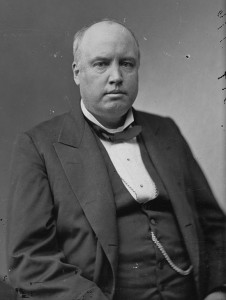Robert G. Ingersoll: Get to Know the Greatest Unknown Orator of the Nineteenth Century

Justice is the only worship.
Love is the only priest.
Ignorance is the only slavery.
Happiness is the only good.
The time to be happy is now,
The place to be happy is here,
The way to be happy is to make others so.
Wisdom is the science of happiness.
–Robert Green Ingersoll
Just 183 years ago, a famous agnostic, humanist, and American’s freethought hero was born. During his life, Robert G. Ingersoll delivered mind-opening rhetoric that challenged late-nineteenth-century Americans to think harder and more critically about the religious ideas indoctrinating Western civilication for millennia. Now humanists celebrate his birthday on August 11 and find that his words still have meaning today. Though Ingersoll’s legacy is unfortunately too unknown by students of US history, continued efforts by humanists and other secular groups persist to correct that gap.
One such effort took place during Reason Rally held in June on the National Mall, attendees could take tours in downtown Washington, DC, to see where the illustrious orator lived, worked, and spoke during his seven-year stay (1877-1885) in the nation’s capital. (The tour can be taken virtually at the Washington Area Secular Humanists’ website.)
Another effort to honor Ingersoll’s memory will take place on August 11, his birthday, this year. The only statue and monument erected to Ingersoll will be rededicated in Peoria, Illinois, where a young Ingersoll started his family and legal career. A bronze statue of him in Glen Oak Park, erected in 1911, needed repair, so the Freedom From Religion Foundation headed a fundraising campaign to raise $30,000 to have the statue renovated and remounted. A celebration of the statue’s renovation will be held with a dinner and speakers marking the occasion.
Anyone looking to learn more about Ingersoll may want to visit his birthplace on Lake Seneca in Dresden, New York, which is now a museum dedicated to his life and work. Open on weekends during the summer, the museum is operated by the Center for Inquiry. This spring, Jeff Ingersoll, a descent of Robert and president of the Ingersoll Memorial Committee, worked to ensure that its front porch was rebuilt, per historic photos of the house.
Those who wish to commemorate Ingersoll’s death might stop by his grave. Ingersoll served as a colonel in the Union Army during the Civil War, so his and his wife’s ashes are buried in Arlington National Cemetery. The cemetery has recently added a grave finder application to their website, which makes it easy to find any grave there and see photos of his gravestone. His grave is not far from the Tomb of the Unknowns.
Of course, books are also a great way to become acquainted with this illustrious orator.The most recent book about Ingersoll is The Great Agnostic: Robert Ingersoll and American Freethought by Susan Jacoby, who is also the author of Freethinkers: A History of American Secularism, which also features Ingersoll.. It is not strictly chronologically organized as a biography, but by the issues he advocated for and spoke about: science, humanistic freethought, church and state separation, and reason, among many others.
Ingersoll’s memory is alive and known by some but unfortunately, still too few. Like women’s history, LGBTQ history, and black history, the history of American secularism, freethought, and humanism has been oppressed, suppressed, and nearly forgotten. We must make conscious efforts to prevent this oversight and have it restored and acknowledged as a valued part of the fabric of American and human history.
